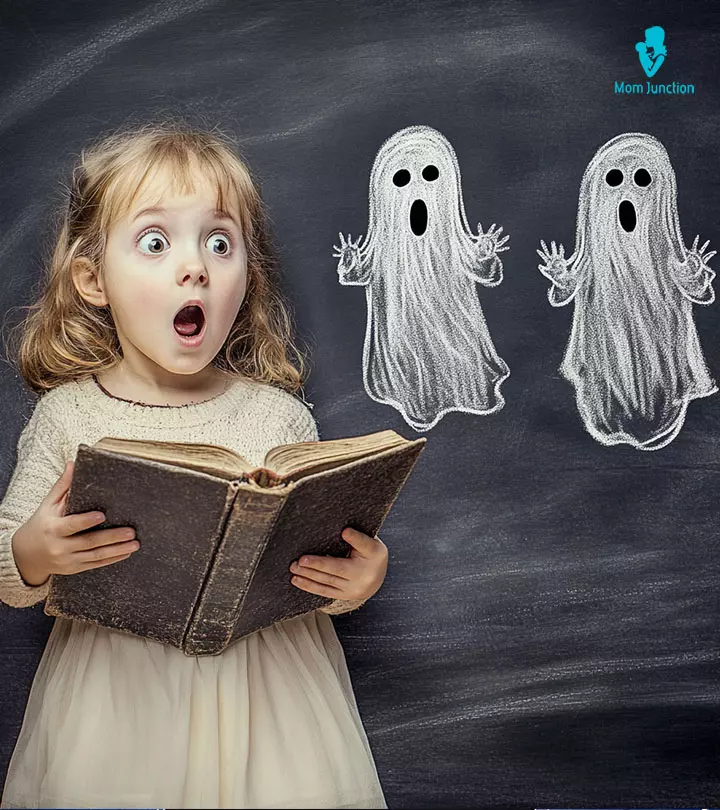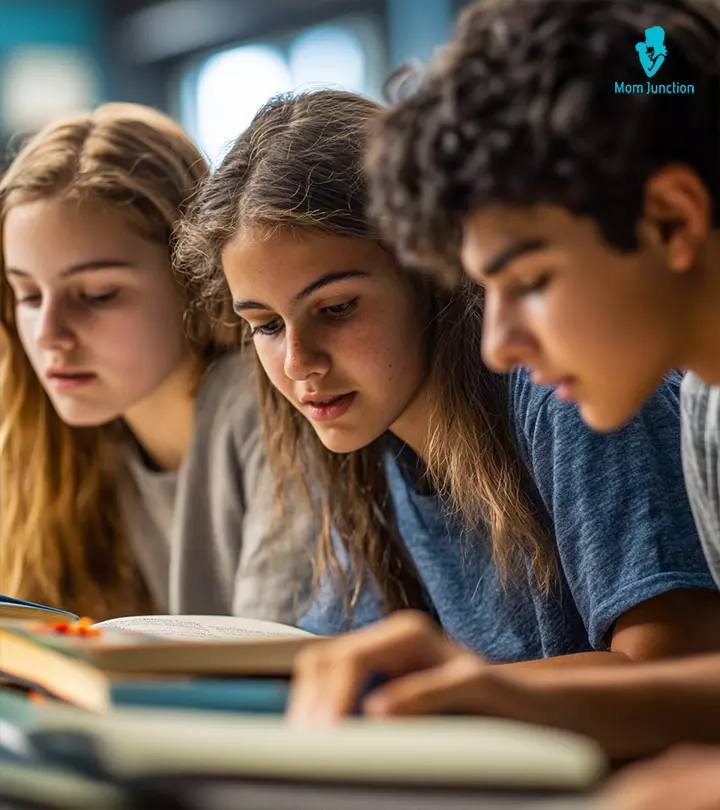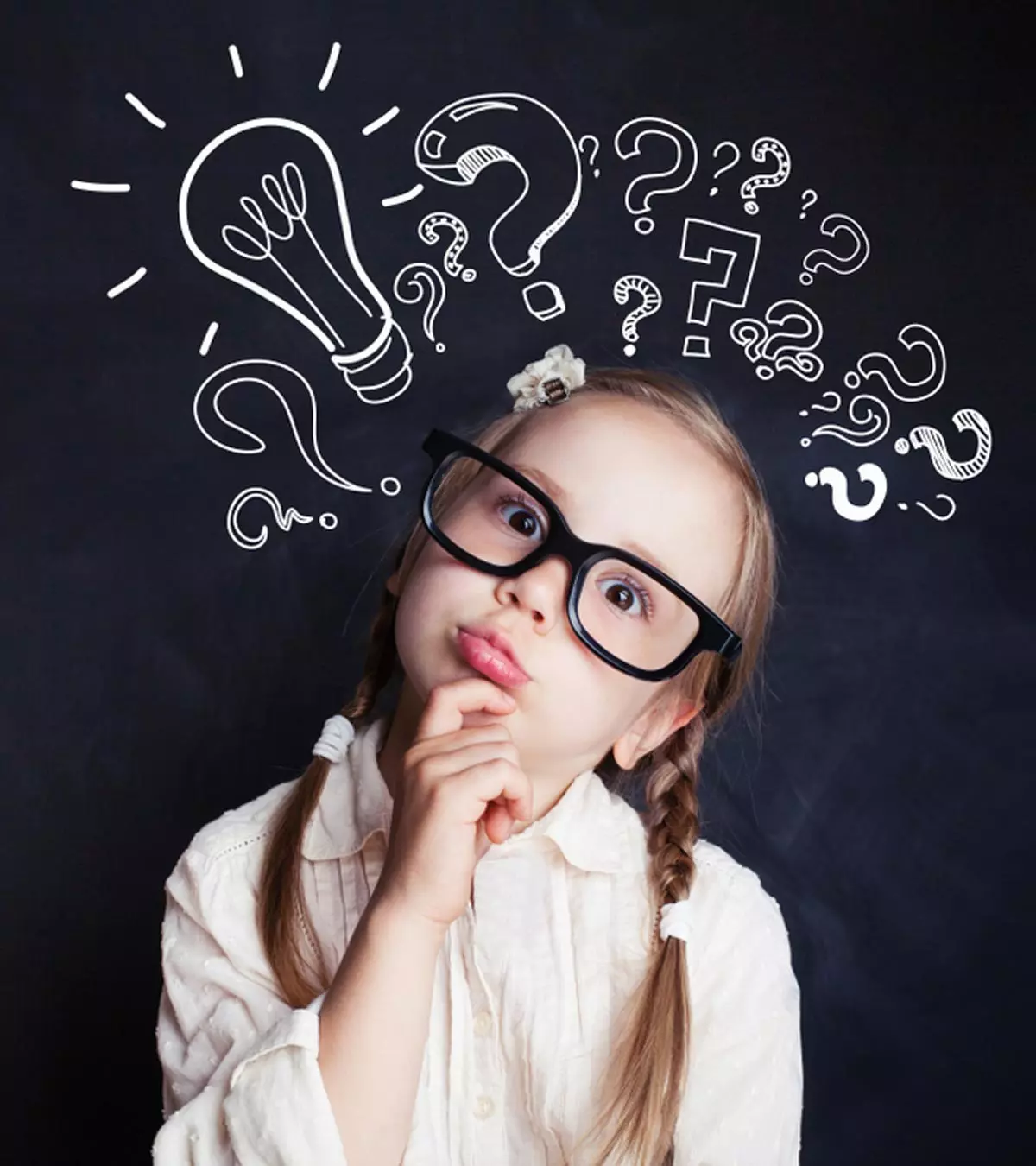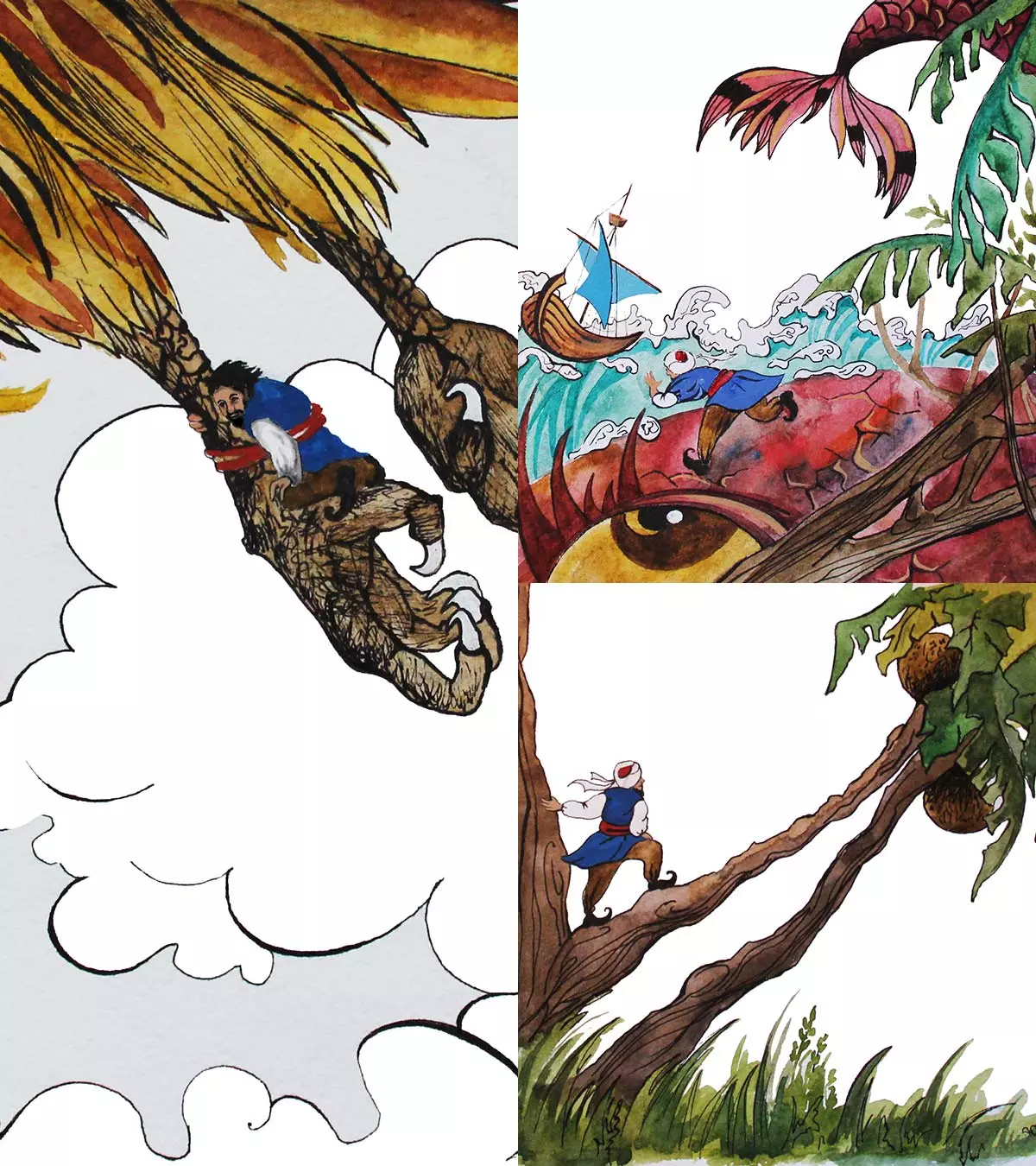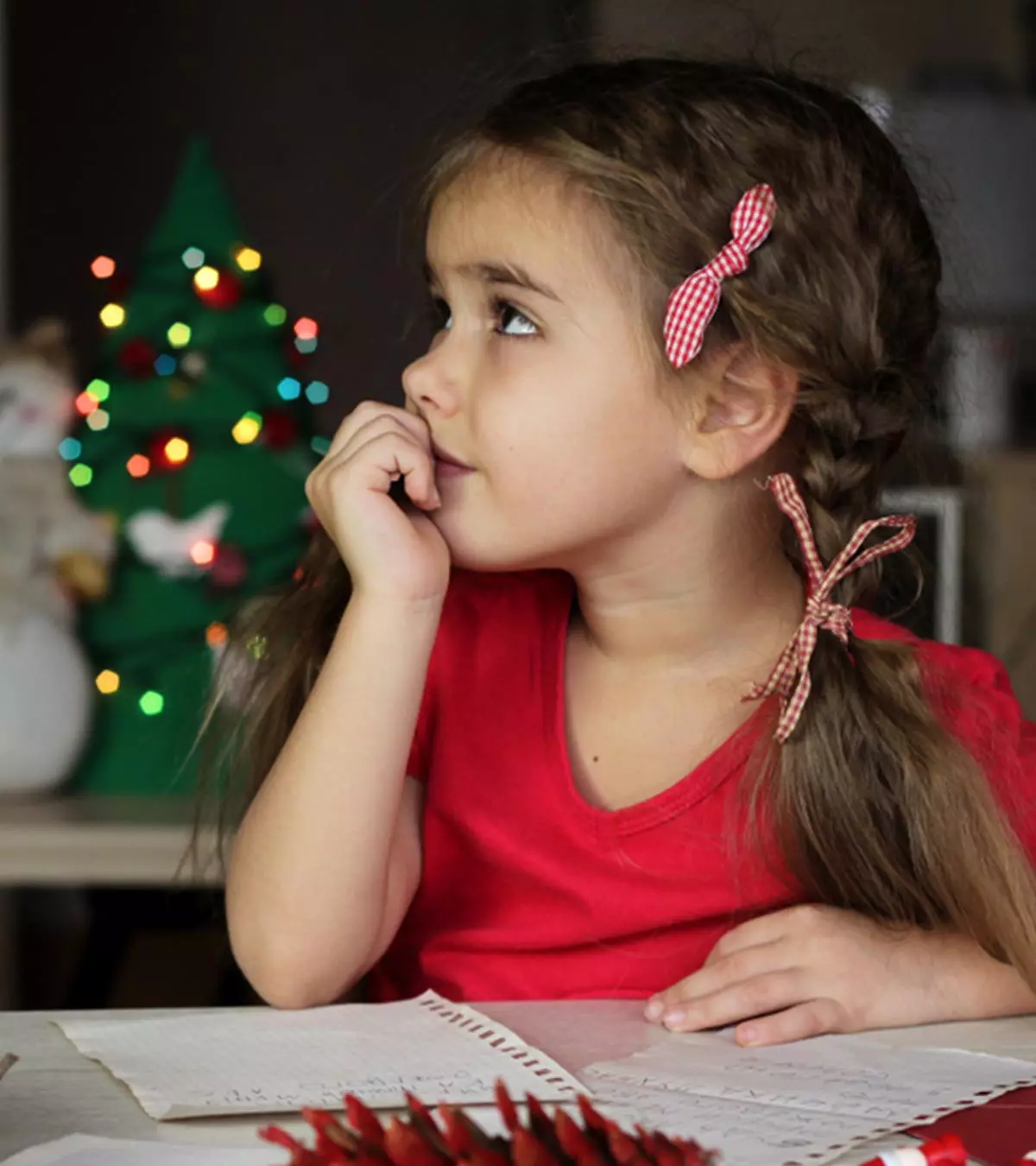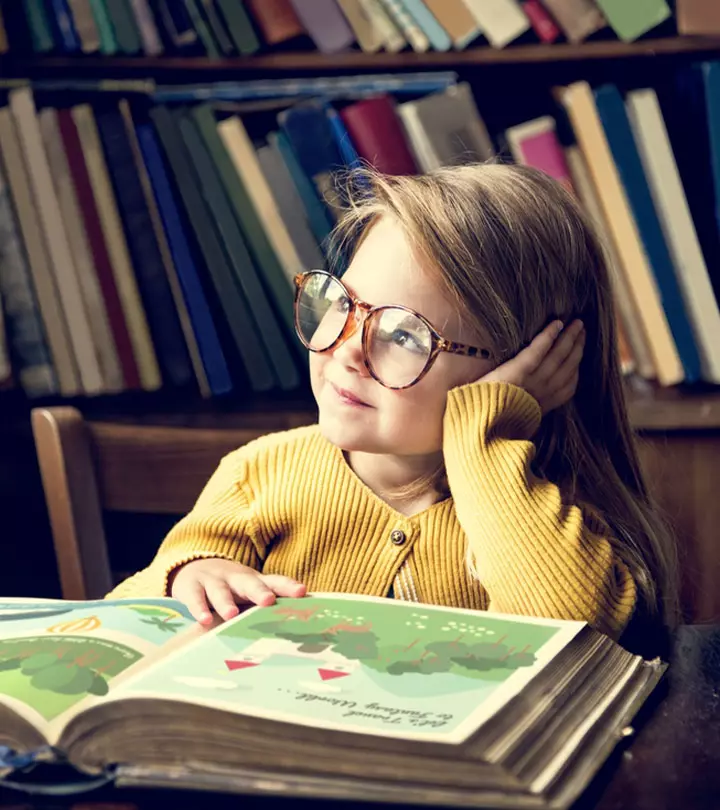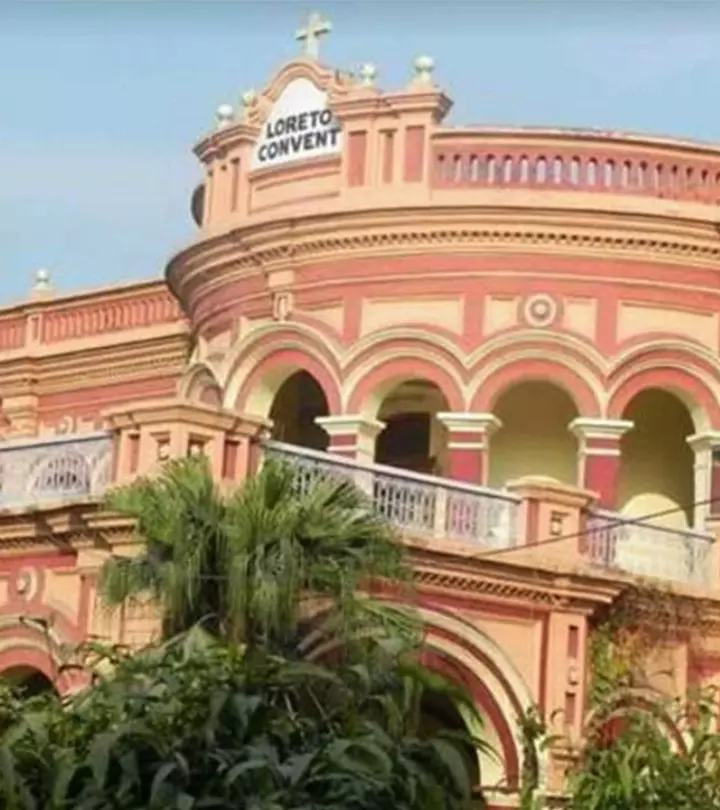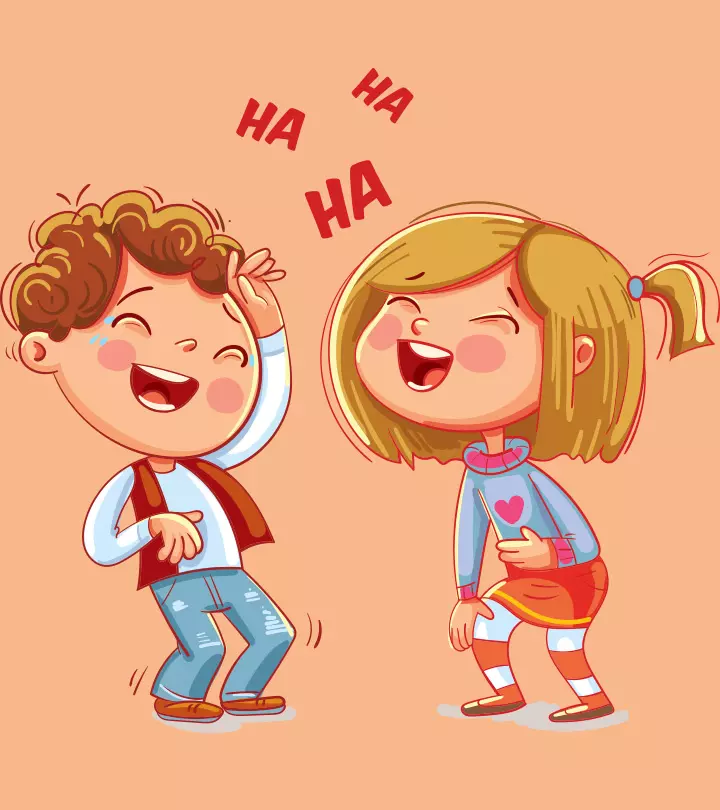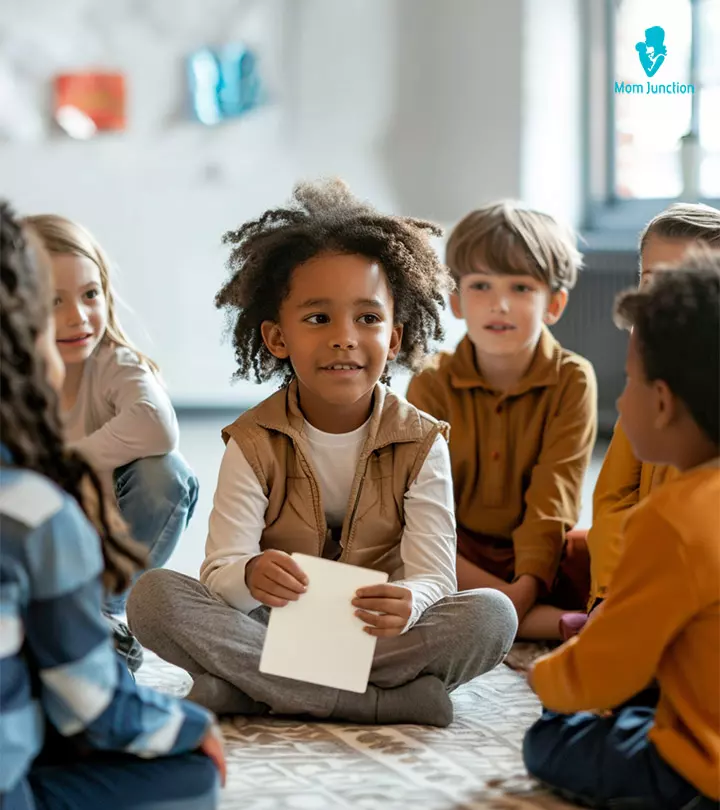
Image: Midjourney/ MomJunction Design Team
True or false questions for kids can help make interesting trivia or quizzes that encourage them to think and learn new things. They are a great way to take a break from their traditional method of studying and have a fun learning experience. You can compile several true and false questions on different subjects to fend off boredom and introduce them to an objective way of learning.
Read this post for a collection of true and false questions on different topics. You could then choose a mix of easy and tough questions and turn it into a fun challenge or quiz for your children to test their intelligence.
150 True Or False Questions For Kids
Here are a few True or False questions and their correct answers. You can use these questions to construct an educational activity for your child. Alternatively, you can use them as a basis to create fun trivia questions for kids based on your child’s age and interest.
1. The Atlantic Ocean is the largest ocean on the planet.
False
Right answer: Pacific Ocean
2. Conductors have low resistance.
True
3. Sharks are mammals.
False
Right answer: They are fish
4. Tonle Sap is located in Vietnam.
False
Right answer: Cambodia
5. The Yamuna is the main tributary of the River Ganges in India.
True
6. The human body comprises four lungs.
False
Right answer: Two
7. The study of stars is called astronomy.
True
8. Carnivores are animal eaters.
True
9. Human skeleton consists of 205 bones.
False
Right answer: 206
10. Molecules are smaller than electrons.
False
Right answer: Molecules contain electrons and other particles, so they are large.
11. Mount K2 is the second largest mountain peak in the world.
True
12. Venice is an Italian city known for its canals.
True
 Quick tip
Quick tip13. Mars is the closest planet to the Sun.
False
Right answer: Mercury
14. Protons have a positive charge, whereas electrons have a negative.
True
15. Saturn is the largest planet in the solar system.

Image: IStock
False
Right answer: Jupiter
16. There are seven continents in the world.
True
17. You cannot cry in space.
True
18. River Nile flows through the rainforest in Brazil.
False
Right answer: Amazon river
19. No word in English rhymes with orange.
True
20. A range of mountains is called a range.
True
21. Shinbone is the largest bone in the human body.
False
Right answer: Femur (thighbone)
22. Cockpit of Europe is the nickname given to France.
False
Right answer: Belgium, because it has won more European battles than any other country.
23. Thomas Edison, the inventor of the light bulb, was afraid of the dark.
True
24. Sudan and Egypt are known for pyramids.
True
25. ‘A’ is the most common alphabet in English.
False
Right answer: ‘E’
26. Canada is the second-largest country in the world.
True
27. An element is a pure substance that contains only one type of atom.
True
28. China is the largest country in Asia.
True
29. Henry VIII had four wives.
False.
Right answer: Six
30. Mount Everest is present in the Himalayas.
True
31. Some animals can get a sunburn.
True
32. Vatican City is the smallest city in the world.
True
33. Elephants use their nose to find mates and identify family members.
True
34. Mercury is the smallest planet in the solar system.
True
35. Crocodiles have sweat glands.
False
36. Scapula is also called a shoulder bone.
True
37. D and C in Washington D.C. stand for District of Columbia.
True
38. The Mediterranean Sea separates Europe and Asia.
False
Right answer: It separates Europe, Africa, and Asia.
39. Anemometer is used for measuring the speed of the wind.
True
40. 5 o’clock in the evening is written as 5 am.
False
Right answer: 5 pm.
41. Grand Central Terminal is the biggest railway station in the world.
True
42. Geo-stationery satellites rotate from East to West.
False
Right answer: West to East
43. Kneecap is also known as patella.
True
44. “Death of Desert” is located in Pakistan.
False
Right answer: Afghanistan
45. Elephants are the biggest mammals in the world.

Image: IStock
False
Right answer: Antarctic Blue Whale
46. Seeds of cotton get dispersed by water.
False
Right answer: Wind
47. The Nile is the longest river in Africa.
True
48. The Palk Strait separates the North and South islands of New Zealand.
False
Right answer: Cook Strait
49. The egg of a hummingbird is the smallest egg in the world.
True
50. The smallest unit of matter is called a molecule.
False
Right answer: An atom
51. The Equator is the latitude that runs through the center of our planet Earth.
True
52. Mass and weight are not the same.
True
53. Sydney is the capital of Australia.
False
Right answer: Canberra
54. Hawaii receives the highest annual average rainfall in the world.
True
55. Collar bone in the human body is also called Clavicle.
True
56. Amount of matter during a chemical reaction changes.
False
Right answer: It remains the same
57. Geomorphology is the study of landforms.
True
58. Mango has just one seed.
True
59. 31st January is when the Sun is closest to the Earth.
False
Right answer: 2nd January
60. Victoria Falls is the largest in the world.
True
61. An object at rest does have inertia.
True
62. River Seine passes through London.
False
Right answer: River Thames
63. Cacti requires a lot of water.
False
64. The Caspian Sea is the largest lake in the world.
True
65. The rate of chemical reaction does not depend on temperature.
False
66. Delaware is the American state with the least number of counties.
True
67. The Sahara Desert is the biggest desert in the world.
True
 Quick tip
Quick tip68. Peanuts are legumes.
True
69. Evergreen trees are common in hilly areas.
False
Right Answer: Hot and humid areas
70. Holland is also called the Netherlands.
True
71. Africa is also called the Dark Continent.
True
72. The North Pole is colder than the South Pole.
False
73. Water vapor is a colorless gas.
True
74. Pattern of stars in the sky is called a constellation.
True
75. Cricket is the national game of India.
False
Right answer: Hockey
76. Acrophobia is the fear of water.

Image: Shutterstock
False
Right answer: It is a fear of heights.
77. Philately is the collection of stamps.
True
78. Zimbabwe is also known as Rhodesia.
True
79. French is the official language of Brazil.
False
Right answer: Portuguese
80. Australia is the Land of Rising Sun.
False
Right answer: Japan
81. Iranian Rial is the weakest currency in the world.
True
82. Penguin is not a bird.
False
83. The hardest natural mineral is diamond.
True
84. There are seven players in basketball.
False.
Right answer: Five players from each team
85. Dogs have 42 teeth.
True
86. ThalamusiThe oval-shaped structure located near the middle of the brain, which processes information sent by four of the five sensory organs. is not the largest part of the brain.
True
87. Zeus was not the king of Gods.
False
88. Father of medicine is Hippocrates.
True
89. A group of monkeys is called a herd.
False
Right answer: Troop
90. The largest artery in the human body is the aortaiThe artery that transfers oxygenated blood from the heart to the rest of the body. .
True
91. Ampere is the unit of electric current.
True
92. The Peregrine Falcon is the fastest bird in the world.
True
93. Omnivores feed only on plants.
False
Right answer: They feed on plants and animals
94. The Moon of Saturn is the second-largest moon in the solar system.
True
95. Tasmania is in Australia.
True
96. Baby mammals feed on the milk of their mothers.
True
97. The biggest port in the world is the Port of Shanghai.
True
98. France is known as the “Eternal City.”
False
Right answer: Rome
99. Burj Khalifa is the tallest building in the world.
True
100. Zebrafish can suffer from the problem of insomnia.
True
101. Ears are essential for imparting balance to the human body.
True
102. Intestine is the largest organ of the human body.
False
Right answer: Skin
103. COVID-19 does not affect kids.
False
104. Nails are made of keratiniA type of protein that helps develop hair, nails, and the outer layer of skin. .
True
105. Abraham Lincoln does not have any middle name.
True
106. Nemo is a kind of pufferfish.

Image: IStock
False
Right answer: Clown Fish
107.Camels can store water in their humps.
False
108. In Japan, there are square watermelons.
True
109. China has two time zones.
False
Right answer: One
110. Elephants take nine months to gestateiThe period of carrying a fetus in the womb. babies.
False
Right answer: 22 months
111. The USA shares borders with three countries.
False
Right answer: Two, Canada and Mexico
112. Molecules are bonded chemically.
True
113. Saturn is known for the “Great Red Spot.”
False
Right answer: Jupiter
114. The United Kingdom comprises three countries.
False
Right answer: Four: England, Wales, Northern Ireland, and Scotland
115. The Amazon river has native dolphins.
True
116. The lemon fruit has just one seed.
False
117. Intensity of earthquakes is measured by using the Richter scale.

Image: IStock
True
118. Bats are blind.
False
119. Japan has left hand sided traffic.
True
120. Sunlight is not important for germination.
False
121. Horses can sleep while standing.
True
122. Female reindeers do not have antlers.
False
123. Duckweed is a kind of aquatic plant.
True
124. The USA and China share the longest border in the world.
False
Right answer: USA and Canada
125. Andes is the longest continental mountain range in the world.
True
126. Wellington is the capital of New Zealand.
True
127. Crocodiles shed tears when they eat food.
True
128. Europe is the most populous continent in the world.
False
Right answer: Asia
129. Turkey is situated on two continents.
True
130. Mammals do not give birth to babies.
False
131. Russia has 11 time zones.
True
132. Tigers do not know how to swim.
False
133. Mushrooms don’t grow from spores.
False
134. Step farming is practiced in hilly areas.
True
135. Botany is the scientific study of plants.
True
136. Mount Logan is the tallest mountain in Canada.
True
137. Nassau is the capital city of Bahrain.
False
Right answer: Manama
138. Mangrove trees can be found in marshy areas.
True
139. Elephants are blessed with a forever memory.
True
140. There are no penguins in Africa.
False
141. The size of the eye of an ostrich is bigger than the brain.
True
142. ChlorophylliThe pigment in plants that converts sunlight into energy or food. is the cause of green color in plants.
True
143. Climbing plants are known as vines.
True
144. Humans came to the Earth before plants.
False
145. Potatoes are roots.
False
Right answer: It is a stem.
146. Peepal trees have a long life.
True
147. Tibet is also known as the roof of the world.
True
148. Moon is the main source of energy on Earth.
False
Right answer: Sun
149. There are one hundred years in a century.
True
150. A dozen is made of 12 units.
True
Illustration: Funny True Or False Questions For Kids With Answers

Image: Stable Diffusion/MomJunction Design Team
Frequently Asked Questions
1. How do true or false questions help children learn?
Asking true or false questions on various topics is one of the simplest and fun ways to help children learn about different subjects. Since these are not trick questions and are generally short, they require the children to answer in either ‘true’ or ‘false,’ which keeps them interested and helps them improve their memory and critical-thinking skills. You can use True and False questions to help children aged 4 and 5 years understand English words better.
According to Teri Courchene, a teacher and a blogger, ”One of the new games I have developed for the students is a True or False Sentence Game. It is both a reading and writing game and builds on the idea that children want to play games with reading and writing before they become fluent readers. Since there is considerable repetition, the children learn to recognize the words we are working with even though the children are (usually) at the early phonetic stage (sounding out individual letters in words). We make a small pouch for the word labels and the children are excited to take the games home and play with their parents. After I ask the child lots of questions about true and false and move lots of words around, I mix up all the words and ask the child to make some sentences. The joy the children get from this game is contagious (i).”
2. What is the purpose of true or false questions for children?
Inquiry-based questions like true or false are a great way to assess children’s knowledge and understanding of a particular subject, topic, theory, or lesson. These questions can assist children in completing their homework and preparing for exams. Also, true or false questions for children can serve as a good icebreaker activity when introducing a new plan or lesson. Additionally, it also provides valuable inferences for teachers and parents to identify specific areas and concepts where children may require further guidance and support.
3. Which topics are appropriate for true or false questions?
You can choose any topic, including geography, literature, history, science, technology, and current affairs, for true or false questions for children. You can also ask true or false questions about their favorite cartoon, anime, series, movies, and comics to make it more fun and interesting.
4. What age range are true or false questions best suited for?
There is no particular age range for involving children in true or false questions. These questions can be incorporated into a child’s play and learning from an early age; however, as they age, the difficulty level and topic variations can be gradually increased according to their age.
5. What are the potential pitfalls of using true or false questions with children?
True or false questions surely provide children with interesting information about a specific topic, but it does not give detailed information. Sometimes, children can memorize certain things and answer correctly without understanding the concept. It is also a guessing activity, so sometimes, children can answer correctly or may get answers wrong based on a presumption or misunderstanding.
6. How do I use true or false questions effectively?
Compile them by different subjects and difficulties. When you want to rid the children of their boredom, ask them easier questions or choose topics they like, but if you want them to revise their lessons or sharpen their memory, ask them tougher questions.
These true or false questions for kids are an exciting way to bring back your child’s interest in studies. You can write these questions down on different pieces of paper, have a quiz show, and make the learning process interesting for your little one. They are sure to enjoy the game and also learn about various things in the process. Coming up with such engaging educational activities will also help keep your child occupied and gain knowledge about new things.
Personal Experience: Source
MomJunction articles include first-hand experiences to provide you with better insights through real-life narratives. Here are the sources of personal accounts referenced in this article.
i. True or false.https://riverdalemontessori.wordpress.com/2012/03/02/true-or-false/
Infographic: True Or False Questions For Kids
Whether you want to teach a specific subject or hone your children’s general knowledge, asking true or false questions is a simple and compelling way to help them learn. Explore this infographic for true or false questions to ask your child(ren) during their study time or while traveling. Illustration: Momjunction Design Team
Key Pointers
- True or false questions are fun and interactive ways to teach children new information and facts without overwhelming them.
- These questions require quick thinking. Hence, they can improve the children’s memory and help them think more logically.
- Create true or false questions across various subjects and add questions about their favorite shows or hobbies to keep them engaged.
- Questions can be adjusted to suit different age groups. Simpler questions can be prepared for younger children, while older kids can answer questions related to complex topics.
- Balance out the true or false questions with deeper explanations to ensure children understand the answers’ actual concepts.
Test your knowledge with this fun true or false game for kids! See if you can answer all the questions correctly and become a quiz master!
Community Experiences
Join the conversation and become a part of our nurturing community! Share your stories, experiences, and insights to connect with fellow parents.
Read full bio of Theresa Bertuzzi
Read full bio of Harshita Makvana
Read full bio of Deepa Thomas











